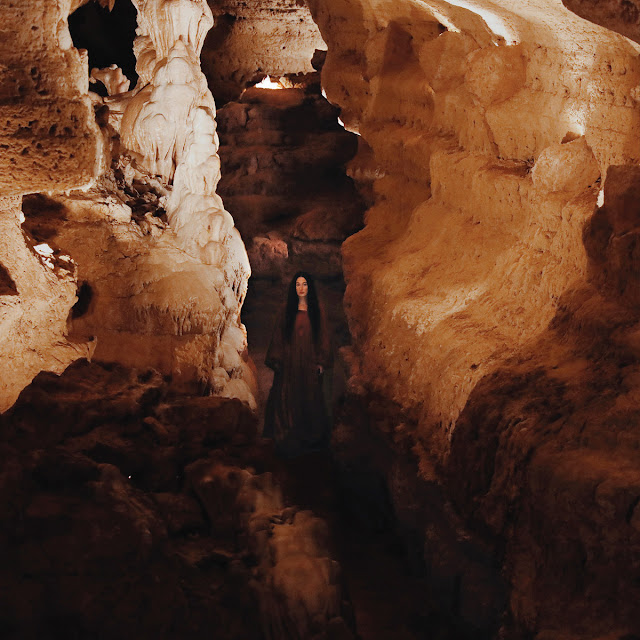There is a way a voice can cut through the fascia of reality, cleaving through habit into the raw nerve of experience. Nika Roza Danilova, the singer, songwriter, and producer who since 2009 has released music as Zola Jesus, wields a voice that does that. When you hear it, it is like you are being summoned -- not to somewhere new, but to a place that's already wrapped inside you, somewhere previously obscured from conscious experience. This place has been buried because it tends to hold pain, but it's also a gift, because once it's opened, once you're inside of it, it can show you the truth.
Zola Jesus's new album, Arkhon, finds new ways of losing that submerged, stalled pain. Not long after she had started writing the songs that would comprise the record, Danilova found herself stuck in a creative barrens, a spell of writer's block more stifling than any she'd experienced before. "It got to the point where I couldn't even listen to music. Everything sounded the same," she says.
On previous albums, Danilova had largely played the role of auteur, meticulously crafting every aspect of Zola Jesus's sound and look. This time, she realized that her habitual need for control was sealing her out of her art. When the frustration of being unable to create became intolerable, she took a leap of faith and reached out for help, something she had never done this early in an album’s lifetime. "At some point, I had to work with other people. I needed new blood. I needed somebody else."
Danilova sent her demos to producer Randall Dunn, known for his work with Sunn O))) and on Jóhann Jóhannsson’s score for the film Mandy. She also began collaborating with drummer and percussionist Matt Chamberlain, whose prior work appears on albums by Fiona Apple, Bob Dylan, and David Bowie. His daring, askance patterning would come to help define the sound of the record. Relinquishing a degree of control over her music and hearing others contribute to it began to thaw the creative block that had kept her from working. "I felt that I was able to finally hear my music in a context that was broader than what I could do on my own," Danilova says. "I'm letting people interpret my musical ideas and my songs in a way that is supporting everything, but also expanding it into a sound that I never would have been able to think of on my own. That was so rewarding to hear."
Arkhon runs the spectrum from songs whose weight lies in their bare simplicity, like "Desire," an elegiac piano composition about the end of a relationship that was recorded acoustically in a single take, to songs that pulse with dense, evolving structures, like "Sewn," a knotty and glittering electroacoustic composition written in total collaboration with Dunn and Chamberlain. Between those poles, "Dead & Gone" boasts a lush string arrangement by Danilova's friend and touring violist Louise Woodward; the overtones of her composition carve abundant, fertile space for optimism and healing to bloom in the midst of overwhelming grief. The towering, groove-oriented track "The Fall" routes Danilova's demo vocals through a lacerating vocoder effect as it seeks out the delights of shaking loose stagnant pain. Throughout “Lost,” tight, interlocking percussion and samples of a Slovenian folk choir propel narratives of collective despair and mutual comfort in kind. Through these turns, Arkhon reveals itself as an album whose power derives from abandon. Both its turmoils and its pleasures take root in the body, letting individual consciousness dissolve into the thick of the beat.
In her creative process, Danilova instead began forging a relationship with the unknown. Rather than try to hold Arkhon in its entirety at every moment of its creation, she began focusing on the direct experience of making work with others, allowing for spontaneous moments of unselfconscious play. After over a decade of classical voice training, she found that this shift enabled her to ease into her singing voice in new ways, leading her to greater flexibility and agility. "I had gone through a deeply transformational process of inner growth. That annihilated a lot of tension in my voice, because my whole attachment to things changed," she says.
That process bears out across the record in the way the voice takes off from itself, splits from its core, tendrils out into currents of partial language and electronically mediated noise. In the rush, Arkhon unearths buried tools for bearing grief, loss, and disappointment. The album's title means "power" or "ruler" in ancient Greek, but it also has a specific valence within Gnosticism. "Arkons are a Gnostic idea of power wielded through a flawed god," says Danilova. "They taint and tarnish humanity, keeping them corrupted instead of letting them find their harmonious selves. I do feel like we are living in an arkhonic time; these negative influences are weighing extremely heavy on all of us. We're in a time of arkhons. There's power in naming that."
Despite the darkness curled inside reality, there is power, too, in surrendering to what can't be pinned down, to the wild unfurling of the world in all its unforeseeable motion. That letting go is the crux of Arkhon, which marks a new way of moving and making for Zola Jesus. "There is a moment where you stop fighting with yourself. That's when things can really happen," Danilova says. "I was disarmed in a way where I just let the process make the record. I could enjoy being in the moment, putting that into the music and letting it unravel or evolve in its own way. To let it have its own story that I only had a part in telling."
Releases June 24, 2022




